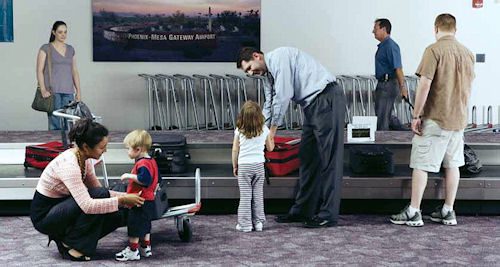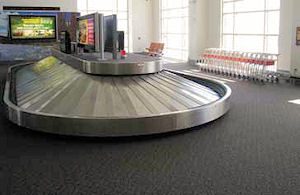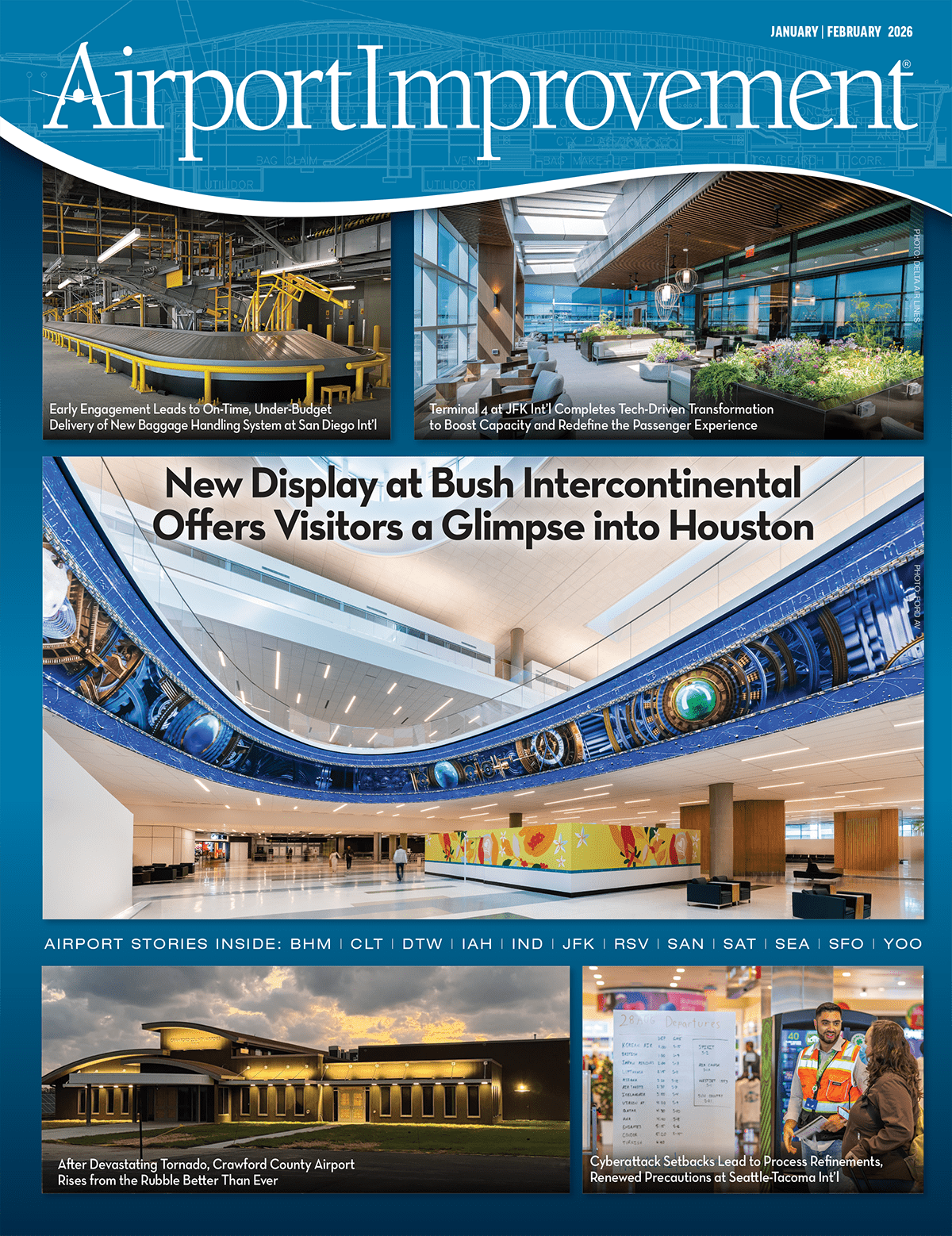|
At Phoenix-Mesa Gateway, free luggage cart use is part of the airport’s “Just plane easy” philosophy. |
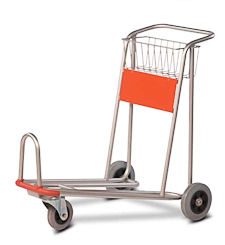 |
People simply don’t understand that carts are cost-prohibitive for some airports, notes Matthew Maass, general services division director for Kern County, which owns Meadows Field and six other county airports. Previously, Maass served as deputy director for the Kern County Department of Airports.
“They just understand that carts are part of their travel experience and should be there when they pick up their luggage,” he explains.
|
Matthew Maass |
That’s also the cart capacity of a dispensing machine from Flight Services and Systems (FSS). Worried about asset liability, Maass agreed to a partnership proposed by FSS: The airport paid for the carts, and FSS maintains the carts (including collecting them each night) and keeps the rental revenue. To reduce start-up costs, FSS retrofitted carts to work with an EZ Cart machine it had in storage.
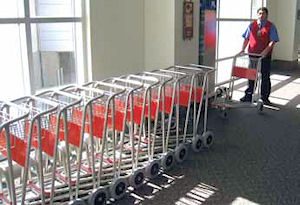 |
|
Meadows Field Airport has teamed with Flight Services and Systems to provide rental carts to passengers. The airport purchased the carts, and FSS maintains them and keeps the rental revenue. |
Without the non-traditional arrangement, Maass notes, Meadows Field would still be without carts. Because FSS was already under contract for handling airline baggage at the airport, there were no additional staffing costs.
Leann Wohl, FSS general manager in Bakersfield, warns against charging too much for carts and considers the $3 user fee at Meadows Field reasonable for the location.
Complimentary Carts
For some airports, charging anything for carts is too much. Nantucket Memorial in Massachusetts and Arizona’s Phoenix-Mesa Gateway Airport both fall in that camp.
Al Peterson, director of Nantucket Memorial, has a strong aversion to charging for carts the airport has purchased. He considers free use of luggage carts part of the experience of flying into the relatively small resort island airport. Last year, Nantucket Memorial serviced about 203,800 enplanements.
Bill Mitchell, director of operations and maintenance at Phoenix-Mesa, agrees. “We tout ourselves as ‘Just plane easy,’ and this is just one of the benefits the airport offers,” Mitchell explains.
Phoenix-Mesa, which had about 287,800 enplanements last year, keeps all 20 of its carts in a stand tucked into a corner of the baggage claim area.
Since customers use the carts to take luggage to their vehicles, carts often are found in the parking area. So far, however, that’s as far as they go. No one has stolen a cart yet, Mitchell reports.
Nantucket Memorial has about 50 carts – some in the secure arrival area, some for use by people coming off unscreened air taxis and still others in reserve. According to Peterson, the airport has tried three different brands of carts, and finding a company that sells them hasn’t always been easy.
Cart Affinity
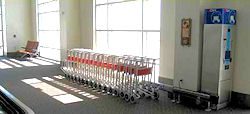
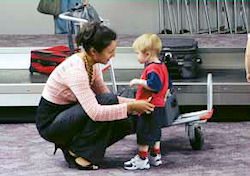
In California, Maass has an affinity for carts made by Danish manufacturer KS Airport Services. He characterizes the carts as competitively priced, given their quality. After the airport transitioned to a new passenger terminal, the acid-treated, stainless-steel carts were kept outside for about a year, and were no worse for wear, he reports.
The carts’ handles, baskets, frames and main axles are welded together, but their castors are held on with a hub nut so they can be replaced when they become worn. The tires are made of gray rubber to reduce the chance of marring floors. Meadows Field purchases the carts from Thompson Contract Inc., which also distributes gatehold seating from German manufacturer Kusch+Co.
Cashing in on Carts
According to Thompson Contract, passenger luggage carts can help airports garner increased cash flow without increased inconvenience.
Justin Thompson, the company’s national sales manager, advises airports to earn revenue through cart rental or renting advertising space on the carts.
Nantucket has cashed in by advertising a rental car company on its cart panels; Phoenix-Mesa is currently investigating similar possibilities.
The carts’ 8-inch advertising panels are easily changed, Thompson points out. So airports can accept advertising contracts for as little as 30 days. Associations hosting conferences in the area and hotels are prime examples, he notes.
According to Thompson, no airport is too small for passenger luggage carts, but a fairly high level of origin and destination traffic helps maximize their use.
Concerns about carts leaving the terminal, he notes, can be addressed by installing bollards that prevent carts from going beyond the sidewalk. Passengers can drive up to the sidewalk for luggage pickup, so the carts don’t need to go into the parking lot.
Consider the Alternatives
While exhibiting furniture at airport conferences, Thompson has learned that some airports are uncomfortable with the amount of money they are sharing with luggage cart providers and are looking for a change.
Furthermore, he says, the old model airports used to determine how many carts they need doesn’t fly anymore. The preponderance of wheeled luggage and the per-bag fees most carriers charge for checked bags are changing the formula.
“That doesn’t mean you can get away without having passenger luggage carts,” he qualifies. “You do have to have them. The question you have to answer is: Do you have to pay through the nose for them or do you find some other way to manage them.”
Thompson encourages airports to consider new options. His company, for example, offers a five-year lease. After the lease expires, carts can be purchased for $1.
Maass agrees that looking for alternatives can be beneficial.
“If you can save 15% to 20% off the usual route, that’s something I think any airport would look to do in today’s economy,” he says. “There are always several ways to do things. Just because something’s always been done that way shouldn’t be the reasoning for continuing to do it.”
At Meadows Field, he notes, customer service is the guiding criterion.
“We want to provide an experience that keeps the traveling public coming back,” Maass notes. “We don’t want to give anyone a reason not to return to our airport.”
|
Company for the Carts Some luggage cart dispensers will soon be dispensing much more than carts. Thompson Contract reports that it will add travel-oriented items to its passenger luggage cart vending kiosks by mid-October. Possibilities include food, beverages, iPod headsets, and baby items such as diapers, pacifiers, bottles and small toys. “We’ve been looking for ways to enhance an airport’s revenue,” explains Justin Thompson, national sales manager for Thompson Contract. “We concluded that the footprint of the vending kiosk is identical regardless of whether it dispenses just carts, or carts and diapers and pacifiers, or iPod headsets and carry cases, or sodas and peanuts, etc.” The new Thompson kiosk will display a variety of travel-oriented consumables in a large window. When customers insert cash or swipe a credit card, the machine dispenses carts and other items in traditional vending machine fashion. “Basically, it uses the same airport floor space but returns much higher revenue with minimal incremental cost,” Thompson notes. |

